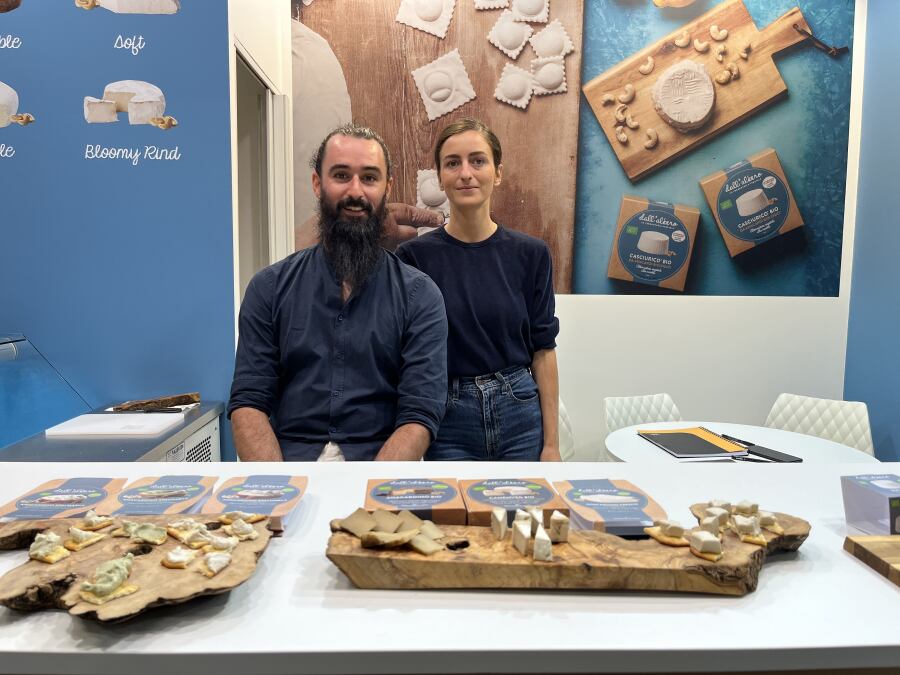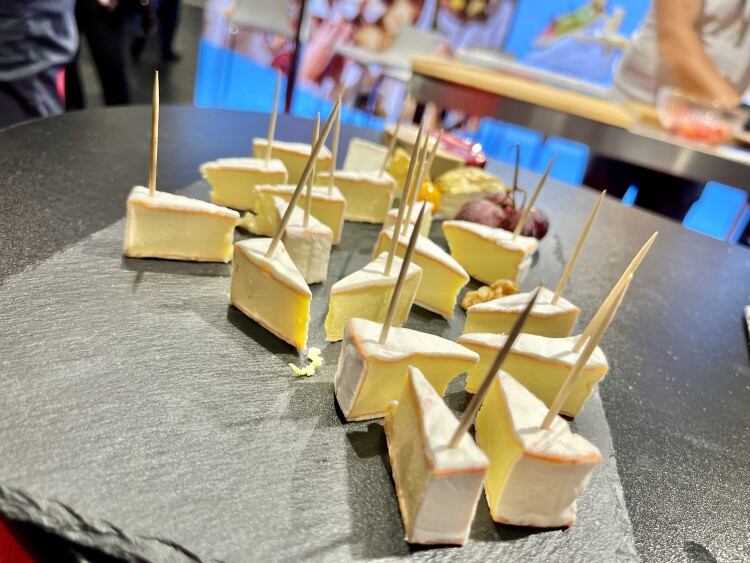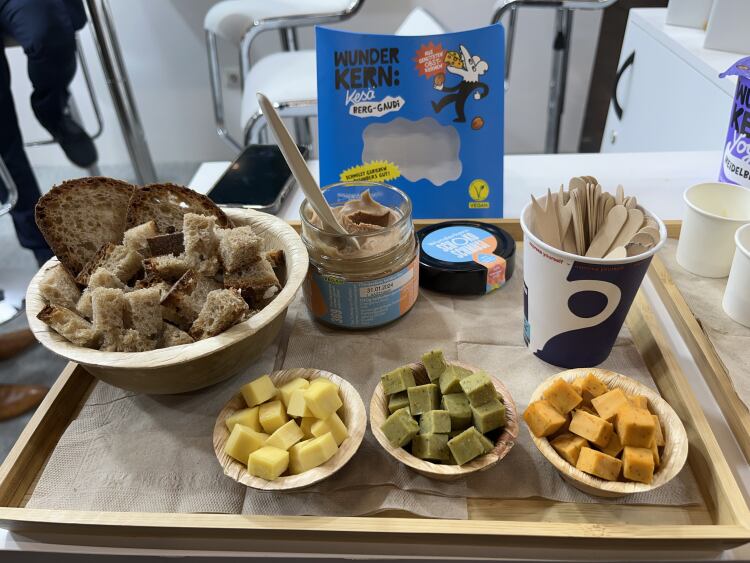This report is part of a series of articles that spotlight product trends in dairy as seen at Anuga 2023, the biennial tradeshow held in Cologne, Germany.
According to Euromonitor International, plant-based dairy is expected to grow by a CAGR of 4% between 2022 and 2027 driven by plant-based cheese, yogurt and milk alternatives1. While the market slowed down last year, advancements in food technology have led to new product innovations, particularly in cheese.
At Anuga 2023, producers of dairy alternatives were given greater prominence with a dedicated section in the Meat and Dairy halls as well as in the start-up galleries. Along soft cheeses with superior taste and texture, we noticed even more plant-based alternatives were being offered by traditional dairy companies, particularly Greek producers, who look poised to explore the emerging plant-based food market in Eastern Europe. Here's what caught our eye . . .

Cashew cheese made the traditional way
Meet Giulia Dentice and Matteo Piccoli, the two parts that form Italian indie organic plant-based cheese producer Dall’Albero. The company was formed almost a decade ago with the idea to produce hand-crafted, organic, naturally fermented plant-based cheese that’s ‘a product in its own right, rather than an imitation’, as Dentice told us. “We started out 8 years ago, but our product has evolved a lot over the years – we spent a long time finessing our processes to make sure our products are naturally tasty and have the right texture without using anything other than cashew nuts and traditional fermentation techniques. Our products are certified organic and are sold in independent Italian shops and online, but we recently acquired a small factory to allow us to grow.”
Before setting up Dall’Albero, Piccoli worked as a dairy cheesemaker and has transferred that know-how into the duo’s current venture. “At events like this, we are sometimes approached by producers of dairy cheese who are impressed by our products and we sort of naturally end up sharing tips with each other – they don’t see us as competition,” Dentice added.
Dall’Albero showcased a selection of soft and spreadable plant-based cheeses, including alternatives to ricotta, camembert, white cheese, three spreads and an aged semi-soft cheese alternative with za’atar spice. The company was looking to partner with a new distributor and is eyeing growth beyond Italy.
Superior mozzarella alternative for pizza
Germany’s Mondarella was established in 2020 but has already grown its product range to include soft, spreadable and grilled cheese alternatives for both the retail and the foodservice sector. The company utilizes almonds, shea butter and rapeseed oil among other ingredients to create its cheese alternatives. For example, Soft Blanc, a Camembert-like plant cheese, includes both shea butter and almonds, while the newly-unveiled Gratinello, an alternative to shredded cheese for pizza, has rapeseed oil and potato starches as its base ingredients. The company doesn’t use natural fermentation but does mature its soft cheeses, i.e. the mold is sprayed on the shea butter mix and the whole thing is then left to ripen.

Mondarella recently marked the sale of 1.5 million units, its primary markets being Germany and Czech Republic. The company released its first product, an almond-base mozzarella alternative, in 2021, and also offers almond-based parmesan alternative packing 26% protein; French-style soft cheeses Soft Blanc and Soft Rouge, an oven-ready Camembert alternative, grill-friendly French soft cheese, a range of spreads, and now, a mozzarella alternative for pizza.
Upcycling apricot kern nuts into yogurt, cheese and milk alternatives
Austria’s Kern Tec has already earned several accolades in recent years for its idea to process otherwise inedible apricot kernels into dairy alternatives, including milk, spreads, yogurt and cheese. New from the company’s B2C brand Wunderkern was a yogurt alternative available in three flavors – plain, vanilla, and blueberry. On the B2B front, co-founder and managing director Michael Beitl revealed the company is teaming up with a major German dairy firm in December – expect to hear more on this at a later stage.
Plant-based dairy in Eastern Europe
A swathe of Greek dairy brands, from Olympus to Dodoni, showcased plant-based dairy alternatives. With many of Greece’s major dairies also exporting to Western and Asian markets, this is perhaps an understandable step given the current global trends, but is also suggestive of the opportunities that exist in Eastern Europe. Euromonitor International estimates that just 509ml of plant-based beverages were consumed in Eastern Europe per capita in 2022 compared to 3,808ml in Western Europe. For milk alternatives, growth is currently slowing compared to the last few years of rapid growth, meaning that underdeveloped markets such as that in Eastern Europe could offer new opportunities for producers, particularly if alternatives can be priced comparatively to traditional dairy.
Olympus’ Evangelos Gougoulakis said the company has had its plant-based milk range Carpos – including pistachio, oat and almond-based varieties - for 10 years now and it’s going ‘really really well’, including a presence in the German market. New at Anuga 2023, the company presented plant-based gouda slices, which will be marketed in Greece, the Balkans and Italy. “We wanted to go with standard types of ingredients so these are made from coconut oil and potato starch as this is still a new market for dairy alternatives. But as a company, we are always open and looking at ingredients and how we can improve our products,” he told us when asked about the cheese alternatives’ ingredients. The company also showcased plant-based puddings in four flavors as well as two types of grated cheese for pizza or pasta toppings, and a Greek white cheese alternative.

Elsewhere, Greek dairy specialist Kourellas presented a new range of plant-based fermented drinks based on coconut milk as well as coconut milk-based fermented plant-based yogurt. Both ranges were new addition to a growing vegan product offering that includes coconut oil-based spreads and white cheese alternatives. The company’s Ifi Barlagianni said: “Three years ago, we launched the plant-based range with the idea to tap into that market. Organic dairy is of course still our strong suit, but this is a product segment that is growing and we think it's important to create more products to appeal to non-dairy eaters or those that are curious about what vegan cheese is like.”
Across the showfloor, dehydrated crispy cheese snacks were a popular offering, but we saw only one plant-based version in the shape of Veganpop, a gouda-flavored popped snack made by the Cheesepop Food Group. Suitable on its own or as a salad topping, the product is a source of vitamin B12 but contains no protein and packs 48g of fat.
Source: Euromonitor International Passport Food and Nutrition data


